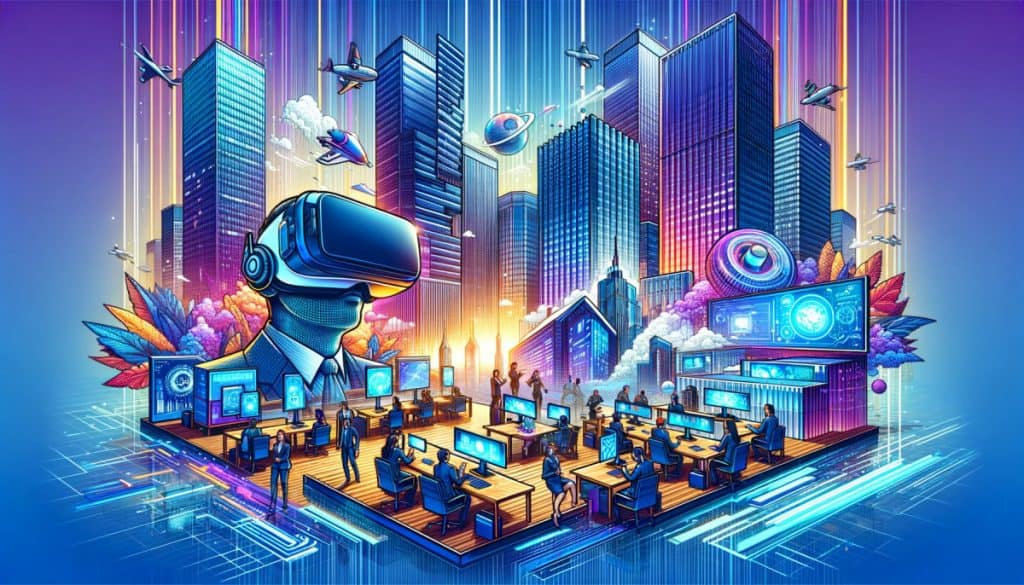Extended Reality (XR) is Reshaping Business Dynamics: a Paradigm Shift in Training and Operations

In Brief
XR is making significant strides in transforming workforce training, resulting in better-trained employees and enhanced business outcomes.

In the fast-evolving landscape of technological developments, Extended Reality (XR) — encompassing Virtual Reality (VR), Augmented Reality (AR) and Mixed Reality (MR), is steadily emerging as a pivotal force, poised to transform the way businesses approach training and operations.
The once-fantastical concept of XR is solidifying its place as a tangible force, promising to reshape the way businesses conduct training and operate. Employing XR in training extends beyond mere employee development, offering a myriad of benefits for businesses. From enhancing collaboration and streamlining processes to optimizing resource allocation, XR’s applications are diverse.
In a conversation with Metaverse Post — Sarah Gilchriest, Chief People Officer of Workforce Learning, the group that encompasses QA, Circus Street and Cloud Academy — shared the profound impact of XR on training and its potential to reshape the future of business.
Gilchriest emphasized how XR technologies are offering a paradigm shift, providing trainees with realistic, hands-on learning experiences that transcend conventional methods. She believes that virtual workspaces, bridging geographical gaps, foster real-time collaboration; while simulations of complex procedures help businesses identify and rectify potential issues proactively.
“XR technologies provide an immersive and interactive learning experience that, in certain conditions, completely trumps conventional methods. It has the potential to unlock a new dimension of employee development,” Workforce Learning’s Gilchriest told Metaverse Post.
“Trainees can be transported into simulated scenarios, replicating real-world environments and situations with unparalleled realism. This immersive approach allows for hands-on learning, enabling trainees to develop critical skills, gain confidence, and make mistakes in a safe and controlled setting,” she added.
How XR is Revolutionizing Industrial Operations
Gilchriest said that in the healthcare sector, XR is making significant strides in transforming training and patient care. VR simulations provide medical professionals with realistic, risk-free environments to practice complex procedures.
“VR simulations provide medical students and professionals with hands-on experience in realistic, risk-free environments, allowing them to practice complex procedures and hone their skills. For instance, surgeons can immerse themselves in virtual operating rooms, replicating delicate surgeries and gaining invaluable experience before performing them on real patients,“ explained Workforce Learning’s Gilchriest.
Moreover, Architects and engineers can utilize XR to visualize designs and streamline project workflows effectively. XR’s is also showcasing its prowess in education, bringing textbooks and classroom lessons to life through AR overlays and interactive 3D models.
“XR in the architecture, engineering and construction (AEC) industries is opening up new opportunities. Digitization and Building Information Modeling (BIM) or 3D modelling and visualisation into the design and construction process has opened up a world of possibilities for optimising building performance,” said Gilchriest. “Designers and facility managers have unprecedented insights into how the layout of their buildings influences a huge range of factors, whether it is maintenance, lighting layout or energy consumption.”
Likwise, Gilchriest shared that the entertainment industry embraces XR for creating captivating and interactive experiences, ranging from virtual worlds in VR games to enhancing live events with MR overlays. AR revolutionizes the retail landscape, providing customers with immersive shopping experiences that bridge the gap between online and in-store interactions.
“With VR, it becomes possible for consumers to visit their favourite retailers online via an interactive shop front in a virtual environment and virtually try on a new look all from the comfort of their own home. The same goes for the potential for people to view interior products, such as a new sofa, in 3D and true to scale in their home,” she added.
Exploring the Future of Immersive Training
XR technologies hold immense potential for revolutionizing training across various industries. Platforms like Meta Horizon Workrooms and Microsoft Mesh, with Teams Avatars, are at the forefront, offering immersive and interactive training experiences.
Microsoft Mesh facilitates shared holographic experiences for individuals in multiple locations. Integrated with Microsoft Teams, it allows virtual meetings and collaborative document editing. The ability to create personalized avatars without a headset enhances accessibility.
Digital Avatars, serving as the face of virtual meetings, offer a more natural and engaging interaction, addressing the limitations of traditional video conferencing. Tools like Microsoft Teams Avatar builder enables users to create expressive avatars, enriching the meeting experience.
“Avatars, the face of virtual meetings, address the limitations of traditional video conferencing by providing a more natural and engaging way to interact. Microsoft Teams Avatar builder allows users to create and customise multiple avatars, including expressive reactions, enhancing the meeting experience,” Workforce Learning’s Gilchriest told Metaverse Post.
XR Technologies Unveil Opportunities and Cautionary Concerns
Gilchriest says that while XR technologies offer promising benefits for training, its potential risks include health and safety concerns, privacy and security issues, cost challenges, technical limitations and resistance to adoption.
“XR is still relatively new, and there may be resistance to adoption from unfamiliar users, therefore any company embracing it would have to plan out an internal comms campaign to get the right messaging out. The goal is to make employees comfortable with XR, understand how to use it safely and recognise the benefits of this type of training,” she emphasized.
Developing and deploying XR solutions can be costly and challenging to scale for large organisations. Gilchriest asserted that for any business considering going down this route needs to look carefully at their ROI. The most cost-effective use cases at the moment are going to be for ongoing training schemes, such as onboarding, and skills that the majority of team members need to acquire.
She said that more specialist, niche virtual training scenarios wouldn’t make sense to develop in house – however – more and more training providers are likely to develop these types of experiences.
“XR can also collect and transmit sensitive data, posing privacy and security risks if not properly managed. These have to be properly assessed and employees should be made aware of any data collection practices,” Workforce Learning’s Gilchriest told Metaverse Post.
The future of training with XR holds transformative potential. Overcoming barriers and limitations could lead to improved quality, accessibility and effectiveness of training, resulting in better-trained employees and enhanced business outcomes.
Disclaimer
In line with the Trust Project guidelines, please note that the information provided on this page is not intended to be and should not be interpreted as legal, tax, investment, financial, or any other form of advice. It is important to only invest what you can afford to lose and to seek independent financial advice if you have any doubts. For further information, we suggest referring to the terms and conditions as well as the help and support pages provided by the issuer or advertiser. MetaversePost is committed to accurate, unbiased reporting, but market conditions are subject to change without notice.
About The Author
Victor is a Managing Tech Editor/Writer at Metaverse Post and covers artificial intelligence, crypto, data science, metaverse and cybersecurity within the enterprise realm. He boasts half a decade of media and AI experience working at well-known media outlets such as VentureBeat, DatatechVibe and Analytics India Magazine. Being a Media Mentor at prestigious universities including the Oxford and USC and with a Master's degree in data science and analytics, Victor is deeply committed to staying abreast of emerging trends. He offers readers the latest and most insightful narratives from the Tech and Web3 landscape.
More articles

Victor is a Managing Tech Editor/Writer at Metaverse Post and covers artificial intelligence, crypto, data science, metaverse and cybersecurity within the enterprise realm. He boasts half a decade of media and AI experience working at well-known media outlets such as VentureBeat, DatatechVibe and Analytics India Magazine. Being a Media Mentor at prestigious universities including the Oxford and USC and with a Master's degree in data science and analytics, Victor is deeply committed to staying abreast of emerging trends. He offers readers the latest and most insightful narratives from the Tech and Web3 landscape.


















































